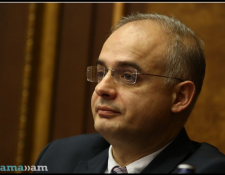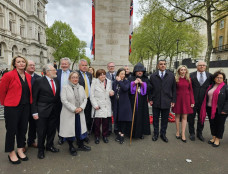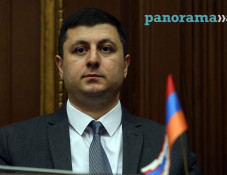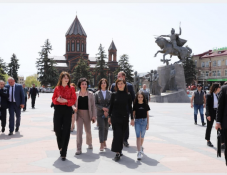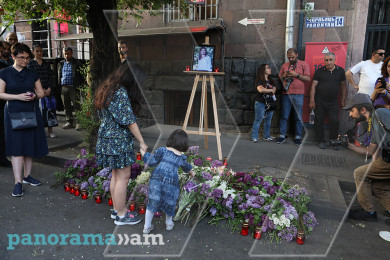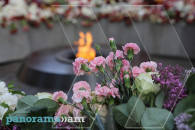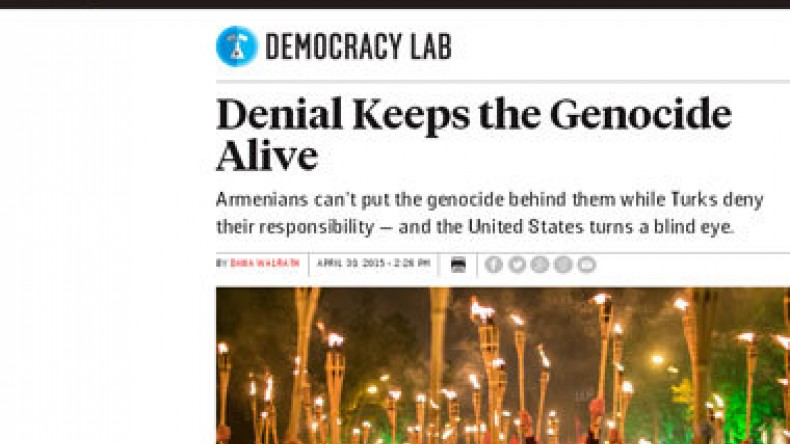
Foreign Policy: Denial keeps the Genocide alive
By Dana Walrath
Foreign Policy
There’s a joke that Armenian immigrants to the United States tell each other. They describe George Washington looking out over the Delaware River, jagged with ice, as two burly rowers behind him, Armenians both, warm themselves with memories of the thick yogurt soup their mothers used to make back home. “What, you’re Armenian? So am I!” says Washington. Like any joke, the immigrant’s insertion of self into American mythology carries some truth: Armenian Americans identify with, and are committed to, the American ideal that peace and justice are intertwined, that brave crossings go into their making.
On April 24, 2015, Armenians everywhere marked a very different sort of crossing: the passage of one hundred years since the genocide in which Ottoman Turks systematically killed 1.5 million of their people. It was on that day in 1915 that hundreds of Armenian intellectuals and community leaders in Constantinople, today’s Istanbul, were arrested and killed. On the premise that the Armenians were disloyal subjects who threatened the security of the Ottoman Empire, a triumvirate of Young Turk leaders in Istanbul ordered a campaign of killing and cultural destruction often described as the first genocide of the 20th century. Armenians were shot, hung, and beheaded en masse; they were burned alive in their homes; they were raped, deported in caravans, and marched into the Syrian desert to die. The survivors scattered across the globe. (In the photo, people participate in a torchlight procession through Yerevan, Armenia to commemorate the anniversary of the genocide.)
While the genocide was taking place, the international community registered its outrage in real time. Hundreds of New York Times articles narrated the horrors. A historic relief effort, Near East Relief, ancestor to the Peace Corps, taught American children of the 1920s to remember the “starving Armenians.” Meanwhile, the architects of the genocide escaped an international tribunal, fleeing to Germany.
The new government of Kemal Atatürk initiated a re-education of its subjects aimed at securing a monolithic Turkish identity. This cultural revolution effectively cut Turkey off from its polyglot history: new alphabet; redacted vocabulary; no more Armenian historical monuments; no Armenian composers, writers, artists. The cultural contributions of other minorities — Greeks, Assyrians, and Kurds — suffered a similar fate. The new Turkish Republic’s propaganda strove, as it still does, to let memories of genocide rest in oblivion. Turkish scholar Taner Akçam has shown how Turkish grade school texts overlook the Armenian genocide, casting the Armenian as a historical cancer and an existential threat from within. Having been raised on this diet for three generations, today’s genocide deniers in Turkey have little reason to doubt their position.
I’m reminded of the success of such propaganda when, as an Armenian-American, fellow citizens ask me: “This genocide happened so long ago, why can’t Armenians let it go?” I think they know the answer — namely, that moving towards a just future requires sincerity about the past. We do better to honor than to bury our mistakes, however colossal they may be. Pope Francis recognized this earlier this month, when he described the mass killing of Armenians by the Ottoman Turks as genocide. In response, Turkey recalled its ambassador to the Vatican. Meanwhile, the United States, United Kingdom, and Australia tacitly endorse Turkey’s policy of genocide denial, fearing reprisal by this strategically important state.
Scholars recognize that genocide takes place in a series of stages, of which extermination is only one; the last stage is denial. Genocide does not end until denial ends.
This year Armenians are not just commemorating a genocide that took place 100 years ago; they are asking to end the denial that keeps this genocide alive.
The persistence of denial by a vibrant culture such as Turkey’s speaks to the destructive, coercive power of shame. But let’s not forget that there is also such a thing as healthy shame. Honest reflection on the past can bring people who were once friendly neighbors back together again.
Such reconciliation was a goal of Hrant Dink, the Turkish-Armenian journalist who was assassinated outside his Istanbul office for his efforts at a truthful accounting of history. A growing cadre of Turkish scholars, journalists, artists and writers, including Taner Akçam, Uğur Ümit Üngör, Orhan Pamuk, Elif Shafak, and others, have managed to journey out of a contrived historical landscape, recognizing that the health of their beloved country is at stake. Meanwhile, Turkish President Recep Tayyip Erdogan offers the familiar “war is hell” incantation: “Millions of people of all religions and ethnicities lost their lives in the First World War … [and] experienced events which had inhumane consequences – such as relocation – during the First World War.”
What if the tables were turned: can you imagine if we in the United States did not own our history of slavery? Can you imagine our children’s history books overlooking American Indians’ presence in North America before Europeans arrived? While historical breaches of human rights in our country are far from healed, at least our history books, in large measure, own up to them. Americans know something of the healing power of justified shame to reestablish productive connections between cultures, to reopen physically closed borders. By forsaking such opportunities, denial of the Armenian genocide poses a moral question that is asked again and again in issues ranging from the question of reparations for slavery in the United States to the atrocities of ISIS in Syria and Iraq: Is it ever appropriate to put political exigencies or financial interests ahead of historical accuracy?
A decade ago, Samantha Power, who today serves as Washington’s ambassador to the U.N., pointed out that the United States’ handling of the Armenian genocide in the decade after the event set up pernicious patterns that still disrupt the world today. It sent a tacit message that genocide is permissible, that we, as a nation, will put short term military, political, and financial interests ahead of justice and truth. It is time to expand the principle put forth by Dr. Martin Luther King in his letter from a Birmingham jail. Injustice any time, and not just any place, is a threat to justice always.
Deep down, we Americans are a nation of immigrants. We know the power of brave crossings. We know that history is more than a bygone, that our interdependence with other nations must rest on more than short-term strategic interests. Genocide recognition is much more than a courtesy to Armenian-Americans. It will align our foreign policy unequivocally with justice and put an end to the impression that we will be bullied into accepting a politically expedient version of history. For America, crossing over to peace has always meant striving for justice. It is time for the government of the United States to recognize the Armenian Genocide unequivocally.
Newsfeed
Videos





